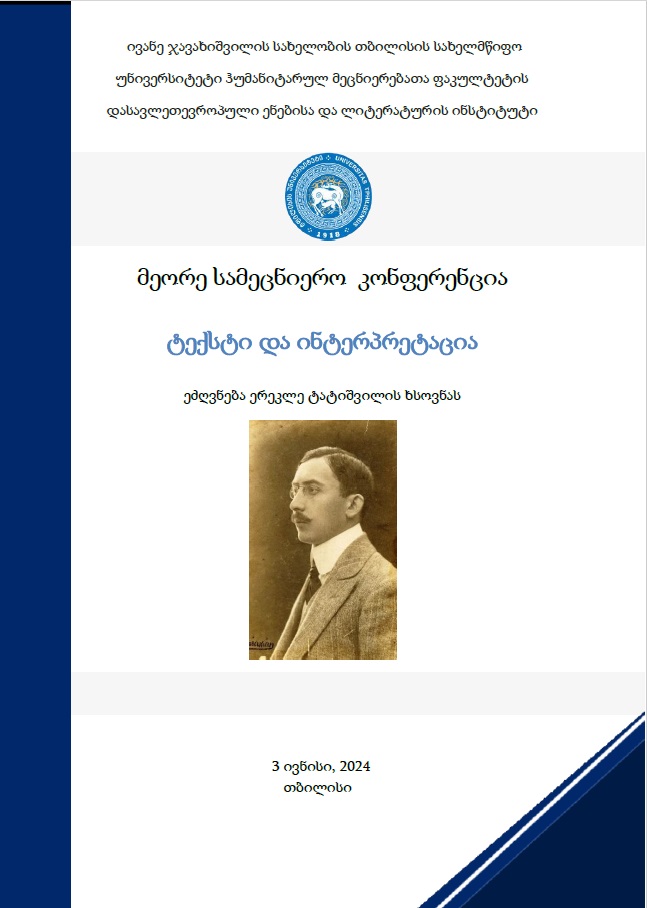Modern stage interpretation of Shakespeare’s Othello
Keywords:
Shakespeare, dramaturgy, interpretation, performance, narrative, textAbstract
It can be said that since the 70s of the 20th century, the goals, forms, genres, and styles of the theater have changed radically. Philosophers, art and theater researchers call this new period of theatre art - postmodern or post-dramatic theatre. When talking about and analyzing contemporary theatrical art or a specific performance, the following terms are used: “deconstructive theatre”, “multimedia theatre”, “restorer of theatrical conventionalities - neo-traditionalist theater”, “theatre of gesture and movement theatre”, “performance theatre”, “happenings”, “physical movement theatre” etc. Modern theater has become more visual, spectacular. In modern theatre there is a sharp distinction between dramaturgical text and theatrical scenic text. Moreover, the dramaturgical text became only one of the components of the theatrical spectacle. A narrative or even a plot in post-dramatic theater is no longer important in a performance.
In post-dramatic theater, a director is a full-fledged author of a play. A director creates a scenic text based on a particular work to convey the message.
There is a long tradition of staging Shakespeare in Georgia. Recently, we have seen several interesting interpretations of Shakespeare in the theaters of Tbilisi and the regions: Avto Varsimashvili’s Othello at the Liberty Theatre, Saba Aslamazishvili’s The Tempest at the Poti Theatre, Davit Doiashvili’s King Lear at the New Theatre. To present the problems in our country and society, the artists always turn to modern dramaturgy of Shakespeare. Levan Tsuladze also chose Shakespeare for the opening of a new theatre space - Theater Workshop 42. Othello is not just a play made in a new space, it is a performance created with the director’s new vision and new aesthetics, where the focus is on working with the actors and bringing forward the Shakespearean text.
Without any pomp, the director and the actors created individual images of each character in the performance, staged with techniques of psychological and romantic drama. It is an ensemble cast where there are no secondary roles, everyone has their own line and each character has something important to say. In this performance, along with others, Levan Tsuladze continues the theme of women’s rights in the trilogy staged at the Marjanishvili Theater: The Kreutzer Sonata, Crime and Punishment, The Marriage of Figaro. In Othello, created with minimalistic methods and interpreted in a modern way, the director depicted the world filled with envy and bitterness, the world where love is sacrificed to jealousy, where love is killed in the name of love.
While interpreting Shakespeare, Levan Tsuladze significantly shortened the text, moved the accents and created a plain, simple performance based on human relations, devoid of any pomposity.
References:
ვასაძე, მ. (2023), სამყარო სადაც სიყვარულს სიყვარულის სახელით კლავენ, ქართული თეატრის ელექტრონული არქივი https://www.theatrelife.ge/samkarosadc
ყიასაშვილი, ნ. (1959), ქართული შექსპირიანა, თბილისი
შექსპირი, უ. (1980), ტრაგედიები, თბილისი: „საბჭოთა საქართველო“
Барт Р. (1989) Избранные работы. Семиотика, поэтика. М.
Брук, П. (1964), Шекспир в наше время, Англия 2, , Англия, ст. 2-18
Лотман, Ю. (2005), Об Искусстве, структура художественного текста, семиотика кино и проблемы киноэстетики, статии, заметки, выступления. СП: «Искусство»
Леман, Х.Т. (2013), Постдраматический театр, Москва: ABC design

